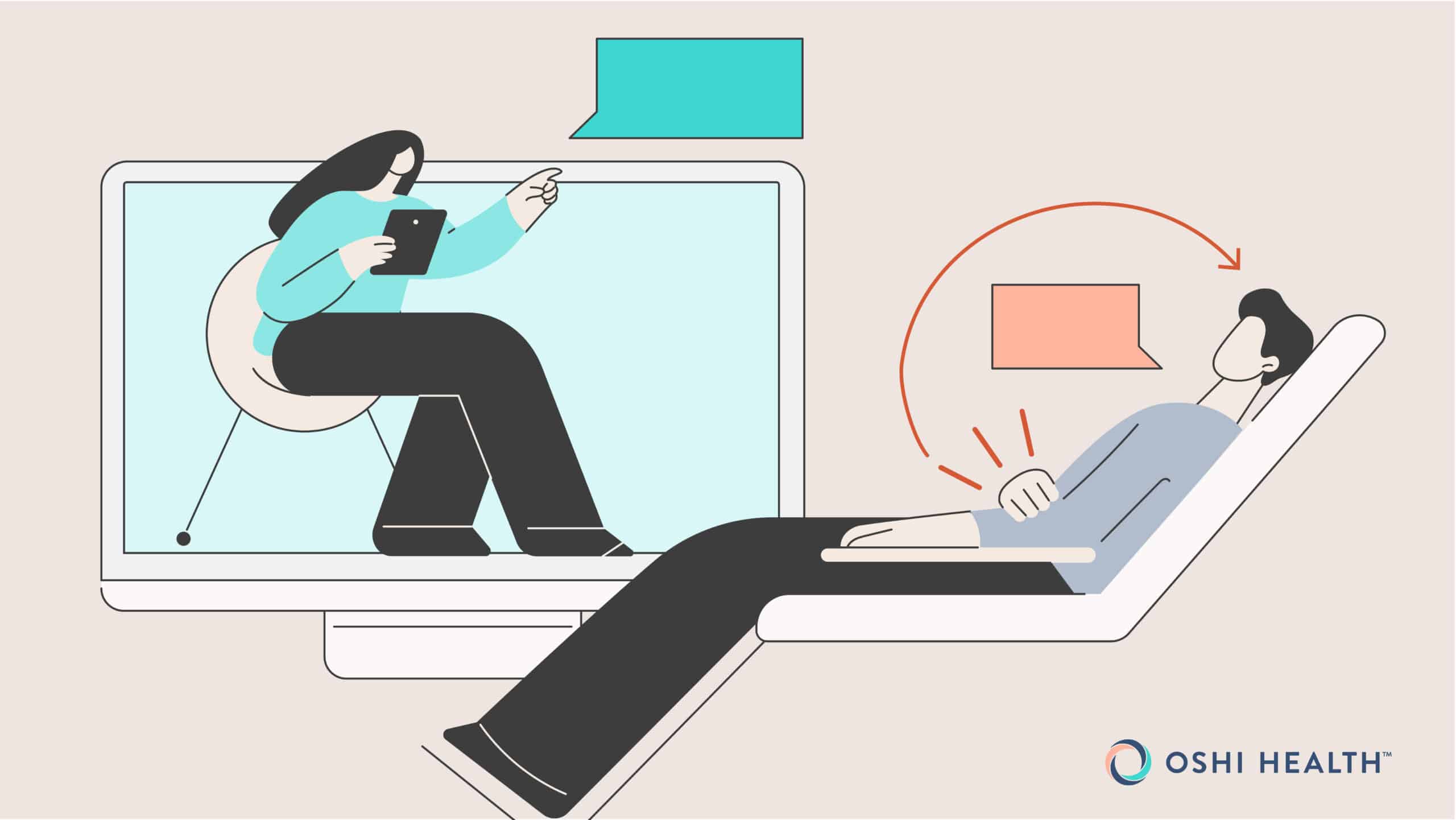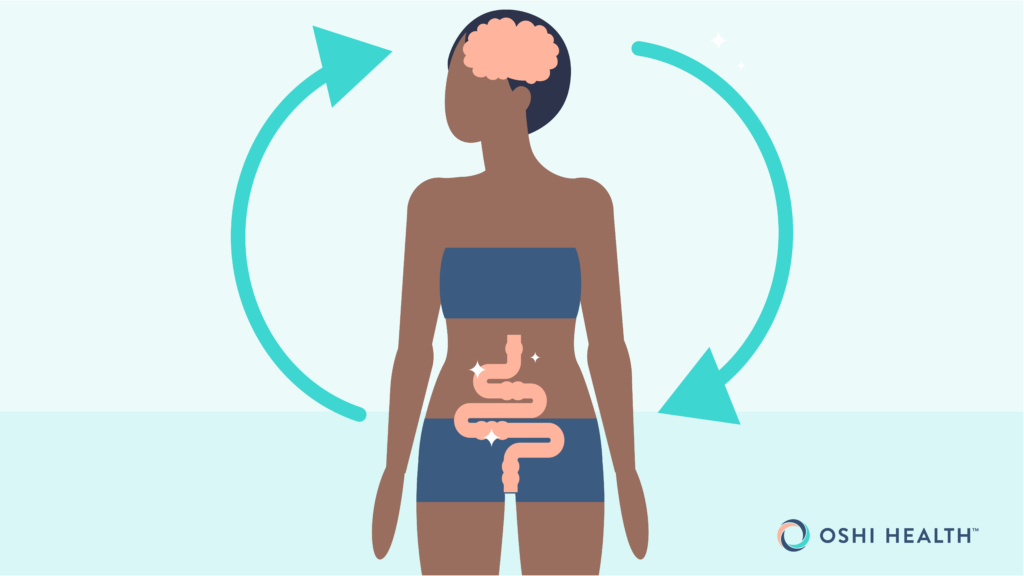A GI psychologist or gut-brain specialist can help you make sense of and improve the gut-brain connection, which is vital to gut health and mental well being. Here’s what to expect when finding and working with a gut-brain specialist.
Have you ever experienced a “pit in your stomach” feeling or “butterflies” when receiving unexpected news? If so, you’re feeling the impact of the gut-brain connection. Your brain and gut are in constant communication with each other—and that communication can affect gastrointestinal (GI) symptoms. A GI psychologist can help make sense of this connection and provide evidence-based practices to improve your mental and digestive health.
But what, exactly, is a GI psychologist—and how do they differ from other mental health providers? Continue reading to learn what sets GI psychologists apart, when to see one, and common interventions they use to help treat GI symptoms.
What is a GI psychologist and how do they help you?
“A GI psychologist is, first and foremost, a clinical psychologist by training,” says Steve Feinstein, PhD, Gut-Brain Specialist at Oshi Health. On top of their education as a licensed psychologist, these clinicians complete additional training on the gut-brain connection and health psychology.
GI psychologists also use the biopsychosocial model to treat GI symptoms. “The biopsychosocial model is the concept that both biology and psychology can impact overall health,” says Michael Bass, MD, Medical Director at Oshi Health, “It’s an integration, or a kind of the melding, of these disciplines into one treatment plan.”
Gut-brain specialists work at the intersection of this model, which differs from the confines of traditional psychology. “I always say to my patients that this isn’t traditional talk therapy or counseling,” says Dr. Feinstein. Many of his patients are currently in therapy or have tried it in the past, so he finds it useful to emphasize what makes GI psychology stand out.
In traditional talk therapy, a therapist develops an ongoing relationship with a patient and discusses any problems related (or unrelated) to other health conditions. GI psychologists focus on the thoughts, beliefs, fears, and concerns related to a GI condition. They do so through evidence-based interventions and often in a shorter time span.
Some of the most common interventions include:
- Cognitive-behavioral therapy for GI (CBT-GI): “One of the more common interventions is using specific cognitive strategies to help patients manage their concerns, their anxieties that surround their GI health, and the impact it has on their lives,” says Dr. Feinstein.
- Gut-directed Hypnotherapy: Hypnotherapy, the use of hypnosis by a mental health clinician, can can help improve brain-gut communication which in turn helps decrease GI pain and other distressing GI symptoms. A 2024 study suggests it might be especially useful for patients with IBS.
- Mindfulness: This approach helps someone focus on the present moment in order to alleviate stress and negative emotions. Gut-brain specialists often employ guided meditations, among other activities, to promote mindfulness.
- Breathing techniques: “Specific breathing techniques, such as diaphragmatic breathing, can manage the nervous system effects that are often disrupting the gut and contributing to symptoms,” says Dr. Feinstein.
- Nervous system rewiring: When a patient has experienced trauma in the past, a GI psychologist may help the patient rewire the nervous system to reduce stress and anxiety, says Dr. Feinstein. This approach focuses on calming the nervous system so it doesn’t feel like it’s in fight-or-flight mode.
Common symptoms gut-brain specialists treat
Bloating, constipation, heartburn, abdominal pain, nausea, and diarrhea are a few of the many symptoms common to GI conditions (and are often treated by multiple providers, not a standalone gut-brain specialist).
But GI conditions are more than the physical symptoms. Gut-brain specialists help treat mental health issues that accompany the physical ones, including:
- Shame and loneliness: “It can be easy to feel alone, ashamed, or unheard when it comes to digestive issues,” says C.P., a patient at Oshi Health, “Oshi made me feel like I had a whole team behind me to attack it from all angles.” Often, a gut-brain specialist plays a significant role in decreasing any feelings of shame or loneliness during treatment.
- Anxiety and stress: Poor gut health can cause anxiety or stress, and anxiety or stress can cause poor gut health. No matter which is the case for you, a gut-brain specialist can provide techniques, such as breathwork or meditations, to reduce anxiety and stress.
- Depression: There is a well-established association between an unhealthy gut microbiome and depression, a condition that most psychologists are trained to treat. What makes a gut-brain specialist different, however, is that they have specialized knowledge on how the gut-brain connection works and its impacts on depression.
- Relationship with food: Many of us have abnormal relationships with food. A gut-brain specialist can help us unpack our feelings around food and create healthier eating behaviors.
GI psychology won’t treat GI conditions like ulcerative colitis and GERD on its own, but it plays a major role in treatment. In fact, one study suggests mental healthcare can lower the frequency of IBS flare-ups.
Why work with a GI psychologist?
Working with a gut-brain specialist can play a crucial role in GI healthcare, but when should— and shouldn’t—you work with a gut-brain specialist?
The short answer: Almost everyone with GI conditions could benefit from a gut-brain specialist’s input.
The long answer: There are myriad benefits and learning about each can set healthy expectations of what it’s like to work with a gut-brain specialist. Four of the most important benefits are outlined below.
1. Specific expertise in GI conditions
A gut-brain specialist doesn’t provide traditional mental health treatment, which is often focused solely on your mental and emotional health. Rather, they have specialized knowledge and training in gastrointestinal conditions, recognizing the interplay between your gut functioning and emotional wellbeing.
2. Personalized, evidence-based tools to manage your symptoms
Unlike traditional therapy that often is ongoing, GI behavioral health treatment is short-term and skills-based, designed to help people take a proactive approach to symptom management.
Common therapeutic gut-brain approaches include:
- Belly breathing
- Relaxation training
- Cognitive behavioral therapy specific to GI conditions
- Guided meditation
- Hypnotherapy
It’s important to note, however, that a gut-brain specialist doesn’t provide a “quick fix” but a long-term solution that works, if a patient is committed. “No matter what the intervention or tool, it takes time to get the maximum benefit, and we want patients to build these tools into their routine over time,” says Dr. Feinstein.
3. Support to help end the stress-GI distress cycle
There is a common myth that GI behavioral health is only for those with severe gastrointestinal symptoms. In reality, most individuals with GI-related distress have noticed that feelings of depression, stress, and anxiety can contribute to their physical symptoms. And it becomes a bit of a “chicken and egg” scenario because many people with physical GI symptoms also struggle with the emotional burden of managing their illness.
A GI psychologist can help untangle this vicious cycle, whether it’s just starting or has been occurring for a long time.
4. A whole-person, team-based approach for overall wellness
Your gut-brain specialist at Oshi Health works alongside a collaborative care team, including your primary GI provider, GI registered dietitian, to build a whole-person care plan customized for your lifestyle and symptoms.
A whole-person approach means your team will consider the many aspects that make you you and will work together—while partnering with you—to ensure that your plan is working. This collaborative team can adjust treatment as needed and provide you with the support you need along the way.
When should you see a GI psychologist?
“In general, someone is sent to a GI psychologist instead of seeking them out on their own,” says Dr. Bass. This referral often comes from another provider, such as a gastroenterologist, and is often seen as a last resort if medication-based treatments don’t work.
However, this isn’t an ideal care model, since gut-brain specialists can play a crucial role earlier in the process. When a gut-brain specialist is looped in from the start, a patient has better access to non pharmacological GI treatments. The gut-brain specialist’s insight enables the whole-person care approach and gives the patient space to explore what works best for them.
“At Oshi, we bring our gut-brain specialists into treatment right from the beginning,” says Dr. Feinstein. Working with a gut-brain specialist from the start often makes a world of difference for patients, including D.P., who suffered from inflammatory bowel disease (IBD) for over 15 years. Thanks to Oshi’s whole-person approach and seeing a gut-brain specialist earlier in treatment, D.P. successfully managed their IBD.
After struggling with my GI issues for years, I feel like I can finally heal with a complete health plan that encompasses diet and mental health.
— D.P., an Oshi Health patient
What should you expect at your first appointment with a GI psychologist?
In the first appointment, a gut-brain specialist will cover the basics. Some of their questions will sound familiar to what a primary care provider asks at a check-up (i.e. noting your caffeine and alcohol use, if you smoke, and a few questions about your medical history). Other questions will be gut-brain specific (asking about any stressors, your sleep quantity and quality, and if there’s a history of trauma).
“The history of trauma can affect the nervous system in a very specific way, and we need to know that information when we’re looking at the types of interventions that we might suggest,” explains Dr. Feinstein.
Based on this information, your gut-brain specialist will discuss intervention options with you. (To jog your memory, the most common are CBT-GI, hypnotherapy, mindfulness, breathing techniques, and nervous system rewiring.)
“A patient will leave with an initial treatment plan and some type of skill or tool to start using in their daily routine,” says Dr. Feinstein. These take-home tasks are a crucial part of treatment, since someone sees a gut-brain specialist fewer times than a traditional therapist. At Oshi, for example, a patient sees a gut-brain specialist about three times, and these appointments are mixed in with visits to licensed registered dietitians and gastroenterologists.
For S.M., these take-home tasks were one of the most impactful parts of working with a gut-brain specialist on their GI condition.
My gut-brain specialist was FABULOUS in that she listened carefully, explained the connection between the brain and the gut, particularly in terms of mental health, and gave me concrete recommendations that are quite doable.
— S.M., an Oshi Health patient
Questions to ask your GI psychologist
“Often, someone is usually coming from an appointment with another provider, who probably answered many of their questions about their GI condition,” says Dr. Feinstein. He notes that at Oshi, a gut-brain specialist will also set expectations for the appointment (i.e. it’s not traditional therapy and instead focuses on your condition and the gut-brain connection), so patients know what to expect when they login to the virtual meeting room.
If your GI psychologist is the first clinician you are seeing and hasn’t already set expectations, there are some clarifying questions you can ask in the first appointment:
- What is the mind-gut connection, and why does it matter?
- What specific mental health symptoms can impact my gut?
- What techniques or interventions can we explore?
- What should I expect from our time working together?
Above all, Dr. Feinstein says an open mind is the best thing to bring to an appointment. He says, “I really appreciate when someone comes in with an open mind and recognition that their brain and gut are connected.”
How do you find a GI psychologist near you
Finding the right GI psychologist can be tricky. To help, we compiled a five point checklist of what to look for in a GI psychologist:
- The psychologist uses a whole-person approach to treat GI conditions.
- The clinician is an experienced gut-brain specialist and has helped others with GI conditions.
- The specialist works on a team with other GI specialists.
- You feel comfortable working with the gut-brain specialist.
- The gut-brain specialist is licensed in your state.
Telehealth options can be a great way to avoid month-long waiting lists and the commute to and from a gut-brain specialist’s office. It can also allow you to access treatment for GI mental health from the comfort of your own home.
If interested in virtual options, remember that a GI psychologist should be licensed in your state, whether appointments are in-person or online.
Available treatments at Oshi Health
Oshi Health provides virtual appointments with gut-brain specialists who embrace the whole-person approach. From the beginning, a patient works with a gut-brain specialist (and a registered dietitian and GI provider). This collaborative, whole-person model allows patients to reduce mental health symptoms faster.
In fact, 87% of Oshi patients report better quality of life, with less stress and anxiety, within 3 months.
For Oshi patient L.W., this approach changed everything. “Oshi is truly a company that cares very much about the individual patient’s struggles and experience, and has a plan to move forward to better health. I could not be more pleased.”
If you’re interested in life-changing treatment for yourself, consider Oshi Health. All our patients are assigned a GI provider who determines the best interventions and treatment options. Most patients see a gut-brain specialist, but the Oshi clinicians you work with are based on your unique needs. Your gut-brain specialist will also collaborate with other clinicians to provide whole-person care that can improve your health for years to come.
Oshi is your partner in digestive health
Feel like your digestive concerns are running your life? You’re not alone—and we’re here to help you find lasting relief.
Oshi Health GI providers, gut-brain specialists, and registered dietitians work together to address your symptoms and find solutions that actually work for you.
Whether you’re dealing with chronic digestive issues or unpredictable symptom flare-ups, our GI specialists deliver:
✔ Personalized care plans tailored to your lifestyle
✔ Science-backed strategies to calm your gut
✔ Compassionate, whole-person care
✔ And so much more!
Ready to take control of your gut health?







